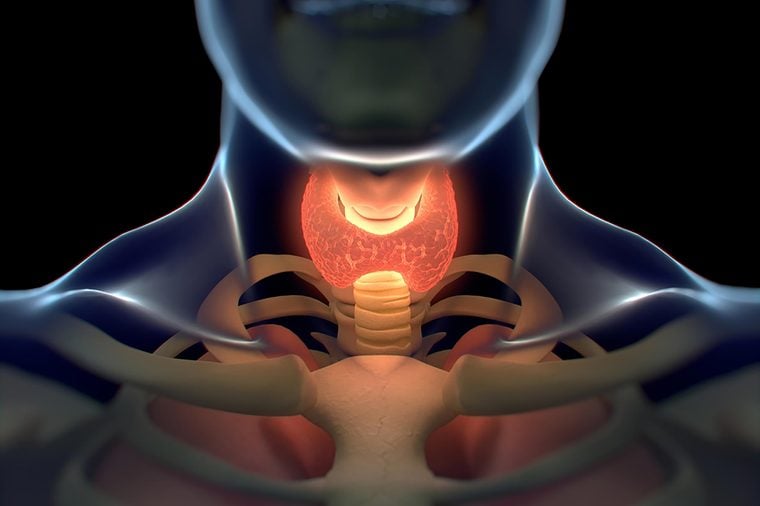When “normal” isn’t normal
You’ve heard of an overactive thyroid (what’s known as hyperthyroidism) and an underactive thyroid (hypothyroidism). That’s when your levels of thyroid-stimulating hormone (TSH) and a related hormone thyroxine (T4) register well beyond the normal range. But your thyroid still may be malfunctioning, even if the levels look normal. Keep reading to learn more about a condition known as subclinical hypothyroidism.

What is subclinical hypothyroidism?
According to research published in 2019 in BMJ, subclinical hypothyroidism (SCH) affects 4 to 20 percent of adults—most commonly women, older people, and those of white ethnicity—and refers to a slightly under-active thyroid. With SCH, thyroid-stimulating hormone (TSH) levels are on the low side while T4 levels remain normal. “It’s called subclinical because many people with these findings do not have the typical symptoms one would expect to find in a patient with clinical hypothyroidism,” says Christian Nasr, MD, medical director of the Thyroid Center at the Cleveland Clinic in Cleveland, Ohio. These are clearer signs you might have a typical thyroid problem.

Is it treated the same as full-blown hypothyroidism?
Experts are still split on the right way to treat subclinical hypothyroidism. “All medical societies agree that clinical hypothyroidism should be treated with thyroid hormone,” says Dr. Nasr. “However, treating individuals with SCH the same way does not always improve the outcome.”

It may be linked to type 2 diabetes
People with SCH and prediabetes—meaning their blood glucose is higher than normal, but not high enough for a type 2 diagnosis—may be at an increased risk for type 2 diabetes, according to a large study published in 2016 in BMC Medicine. Researchers found that the combination of prediabetes and even a slightly underactive thyroid increases the risk for type 2 diabetes by 13 percent. These signs of type 2 diabetes can be easy to miss.

It may affect your heart and metabolism
More research is necessary, but “SCH could be associated with heart issues or metabolic disorders,” says Dr. Nasr, echoing the findings of a study published in 2015 in Endocrinology and Metabolism, which suggests that SCH may be a risk factor for cardiovascular disease. Find out the metabolism myths you can safely ignore.

It appears to impact your brain
In a review of 13 studies published in 2015 in The Journal of Clinical Endocrinology & Metabolism, researchers found that people with SCH who were younger than age 75 had a 56 percent increased risk of impaired cognitive function and 81 percent increased risk of dementia. The reason may be because the longer your thyroid is underactive, even slightly, the more the thyroid gland is stimulated to release more hormones. This could lead to an enlarged thyroid (called a goiter) that could lead to cognitive issues like brain fog, forgetfulness, or depression.

It could affect your fertility
A study published in 2015 in the Journal of Pregnancy found that women with SCH had more trouble getting pregnant and gave birth to fewer children than those without SCH. Low hormone levels can affect ovulation, which makes it harder to get pregnant. These are other silent signs of infertility.

You may feel fatigued
Just like people with hypothyroidism, some people with SCH may feel low energy, says Dr. Nasr. In other words, you’re more tired than usual doing regular activities, for no reason at all (you’re not sick, or you haven’t changed your routine). These are the best foods for a quick energy boost.

You might notice weight gain
Although there isn’t a lot of research to support weight gain in people with SCH, it could be a sneaky sign of the condition, according to a study in the Indian Journal of Endocrinology and Metabolism. Unbalanced hormones can slow your metabolism, causing the pounds to gradually pile up, even when you haven’t changed your exercise or eating habits. These are the worst habits for belly fat.

You could feel cold all the time
If you can no longer tolerate cold weather or you feel cold all the time regardless of the weather, it could be a sign of a slightly underactive thyroid, Harvard Medical School reports. Check out these 12 medical reasons you’re always cold.

You may suffer from constipation
Thyroid hormones help regulate the digestive system, so too little coursing through your body could trigger constipation, per Harvard Medical School. If this is a problem for you, try these constipation cures.